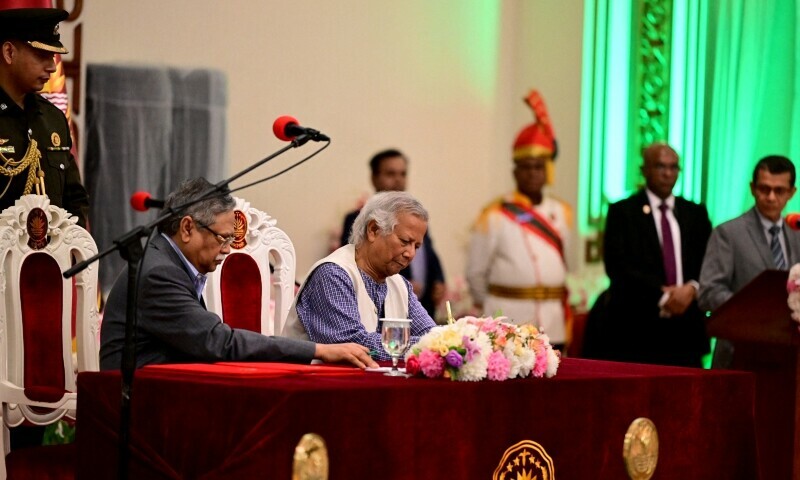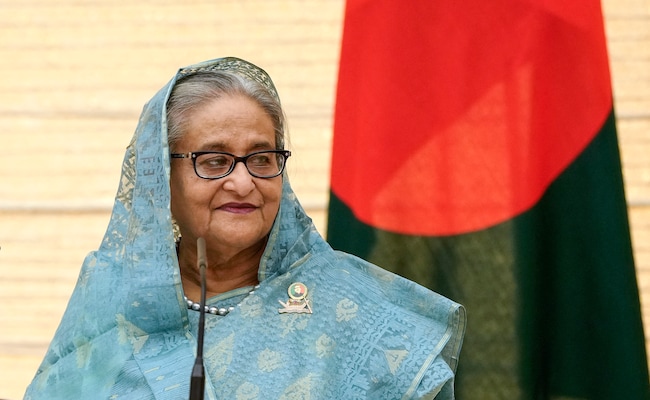The political turmoil in Bangladesh offers stark lessons in governance for countries in the Global South, as well as a cautionary tale for developing countries as they pursue political reforms and economic growth.
Following extraordinary student-led protests, the country’s long-time leader, Sheikh Hasina, resigned as Prime Minister and fled to India in early August.
The protests were sparked by the announcement of a quota system in government jobs. But while the quotas were the trigger, the deeper issue was what many in the country saw as a gradually increasing authoritarian turn by the Hasina government, marked by rising restrictions on civil society as well as the filing of cases to silence opposing voices.
Among those targeted by the Hasina government was the Nobel laureate and micro-finance pioneer, Professor Muhammad Yunus, who has now taken over as the Chief Adviser of an interim government charged with managing a perilous transition.

Nobel laureate Muhammad Yunus (C) is sworn in as the chief adviser of the new interim government of Bangladesh in Dhaka on August 8 as President Mohammed Shahabuddin (2L) administers the oath taking ceremony.
Yunus, 84, has pledged to hold “free and fair” elections once the interim government carries out vital reforms to restore institutions that were hollowed out by the previous government, including the judiciary as well as the security forces.
This will be no easy task. Notwithstanding the challenge, Yunus has, so far, struck the right notes. He has correctly prioritized the importance of restoring a truly inclusive democracy in Bangladesh, even as the country continues to grapple with serious economic challenges.
Indeed, the Bangladesh crisis, and Hasina’s ignominious exit, have underlined that political and economic reforms, for any country in transition, need to go hand-in-hand. Hasina failed to recognize the dual importance of addressing public concerns on both economic issues and political aspirations.
The clear lesson from Bangladesh for fellow developing countries is that one cannot be ignored at the expense of the other. That was, in fact, the takeaway from Yunus’s first major global address in his current new role. Speaking virtually at a “Voice of Global South” summit hosted by India on August 17, Yunus said the interim government that he is helming was committed to “the restoration of all state institutions to ensure democracy and human rights through meaningful reform.” These were institutions that many in Bangladesh viewed as having been compromised by the rule of Hasina, who had sent many among the political opposition to prison and sought to silence independent civil society voices, including Yunus himself, through the filing of court cases.
If restoring Bangladesh’s democracy is a pressing, even if arduous, objective, the immediate priority is the restoration of law and order. A rise in attacks on the minority Hindu population has been reported amid the political unrest, and Yunus has been among the public figures calling for the protection of minorities. Social stability will, no doubt, be the first step before conditions are ripe for the holding of free elections.
The broader backdrop to the political uncertainty in Bangladesh is the economic situation. There is widespread concern especially at the employment prospects facing the country’s around 170 million people. The youth make up two-thirds of the population. It was thus hardly surprising that the protesters who took to the streets were overwhelmingly young – many of those marching through Dhaka were students.
The trigger for the protests was a decision by the courts to re-institute a quota system for government jobs. The measure would reserve 30% of civil service jobs for the descendants of freedom-fighters, undoing earlier efforts to reform the quota system. The protests subsequently snowballed into a movement that voiced wider concerns about where Bangladesh was heading.
Hasina’s response certainly did not help, including her ill-advised statement, made in July, referring to protesters as the “children” of those who collaborated with Pakistan during the 1971 liberation war. Bans on social media and internet restrictions followed. So did alarming violence that spiked amid reports that the ruling Awami League’s student wing, the Chhatra League, had been deployed to attack protesters and students.
After weeks of unrest, violence, and a growing death toll, the Supreme Court finally moved to reduce the quota to 7%, down from 30%. But by then, the die had been cast. The protesters were now calling for nothing less than the Prime Minister’s resignation. Losing control over the situation as protesters gathered outside her residence – and most significantly, appearing to also lose the army’s support – Hasina fled on August 5 to India, where she remains.

Former Bangladesh Prime Minister Sheikh Hasina
Where does Bangladesh go from here? Three key questions will likely determine the fate of this nascent revolution. On the political front, how quickly the interim government can push through reforms, and lay the foundation for elections, remains to be seen. The biggest challenge for any grassroots revolution is the transition from rebelling to ruling. This is all the more true in a young country such as Bangladesh without resilient institutions to act as a check on political power. Complicating the political scene is the bitter domestic political rivalry between the Awami League and the main opposition Bangladesh Nationalist Party (BNP) that has dominated Bangladeshi politics.
Whether this “second revolution,” as some are calling it, can break free of this political cycle, and establish a robust, democratic political system with institutions that can withstand the pressures of political authoritarianism as well as a rising Islamist movement, will ultimately determine its success or failure.
Secondly, the outpouring of public concern on the quota system laid bare the widespread economic concerns in a country that boasts, as is the case in many fellow Global South nations, a young labour force that is struggling to be absorbed into the job market. In June, the Executive Board of the International Monetary Fund (IMF) completed its second review of the Extended Credit Facility (ECF) it is offering Bangladesh, and expressed concerns that the economy faced multiple challenges and remained vulnerable. GDP growth slowed to 4.8% in the first half of the year, even as inflation touched a decade-high 9.7% in April.
The IMF also flagged the need to build greater resilience to natural disasters and climate change in a country that has grappled with recurrent flooding, including in the immediate aftermath of the protests. As of August 23, at least 13 people had been killed following the most recent bout of monsoon-triggered flooding, while more than 4 million people had been displaced. Climate-related disasters and increasingly frequent extreme weather events are emerging as a pressing concern for not just Bangladesh but for much of the Global South. Climate concerns were, in fact, a key issue at the August 17 summit hosted by India, along with health and energy security.
Thirdly, Bangladesh will need to smartly leverage external relationships in order to create the right environment to deal with its myriad challenges at home. Yunus, at the August 17 summit, implored Bangladesh’s partners to continue supporting the country through trade and investment. But that will be easier said than done. The country’s neighbours, including India, are still reflecting on the recent political upheaval. For New Delhi in particular, its close relations with the previous Hasina regime, not to mention the former Bangladesh Prime Minister continuing to remain on Indian soil for the time being, will complicate how it takes ties forward. There will certainly also be some reflection among Indian policymakers on whether their full-fledged backing of Hasina finally led to a failure to grasp the rising tide of political unrest and unhappiness at her rule.
There is a broader lesson here. Indeed, China similarly discovered such political risks in Sri Lanka as recently as in 2022, when popular protests, also driven by economic concerns, led to the ouster of the Rajapaksas, whose close relations with Beijing came under the spotlight during the protest movement, just as India’s Hasina links received attention in Dhaka.
As Bangladesh’s key partners, including India, China and the U.S., now look to resume their engagement with the next dispensation in Dhaka, perhaps one lesson for them, in the wake of recent events, is to take a wider view of their relationships beyond whichever political party happens to be at the helm.
This lesson holds all the more salience in a region that has seen no shortage of political upheavals. Countries need to broad-base their engagement, particularly with civil society and with the business community as well, to create relationships that are durable, sustainable, and able to withstand the vicissitudes of domestic politics. For now, the region must give Bangladesh a supportive hand as it navigates a perilous moment in its history, regardless of the nature of the dispensation that comes to power after the transition – as long as it retains the backing of the people.
